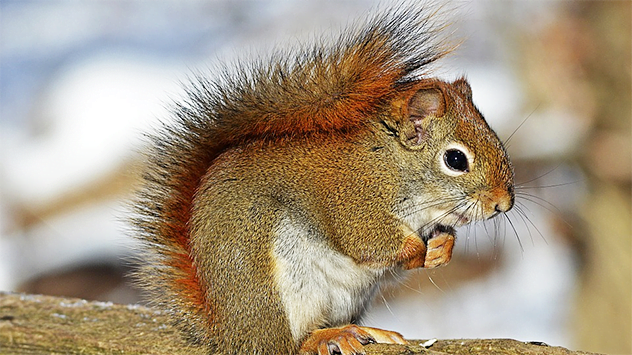Stink bugs can find entry points into your home and turn into an infestation. They’re an invasive species that are native to Eastern Asia (including Japan) and were first reported in the United States in Pennsylvania. Stink bugs release an unpleasant odor as a defense mechanism and can appear in large numbers. There are many species of stink bugs.
If you have a stink bug infestation, it’s time for pest control. When removing these pests, you may be wondering if stink bugs bite humans and if they spread diseases.
If you find predatory stink bugs in your home, this article explains what you need to know — whether stink bugs bite or sting, what these bugs eat, and if they’re a danger to you and your family.
This site receives compensation from the companies featured in this listing, which may impact where and how products appear. This listing doesn’t feature all companies, products, or offers that may be available.
The Mouth of a Stink Bug
Unless you’re an entomologist, chances are you’ve never seen an adult stink bug’s mouthparts up close and personal.
Not every insect has the same type of mouth, which is why the term “mouthparts” is used. It identifies the specific setup each insect has for ingesting food.
The mouthparts of stink bugs are unconventional and differ from other household pests like bed bugs, cockroaches, and wasps. It’s also important to note that stink bugs emit a foul odor as a defense mechanism, so treating a stink bug control infestation is different than treating other household pest infestations.
Stink Bug Mouthparts
The mouthparts of a stink bug are similar to a needle.
This “needle” pierces into the skin of the fruit or vegetable and extracts nutrients, sucking them up and in. Stink bugs tend to favor foods with a hard outer layer that they can puncture with their mouthparts, almost like a syringe. They commonly feed on ornamental plants, as well as on fruits and vegetables.
Do Stink Bugs Have Teeth?
Brown marmorated stink bugs (the kind you’ll see swarming through your house in winter) don’t have any teeth. They don’t need them for their diet or defense mechanisms. The diet of a brown marmorated stink bug is mostly plant sap — they don’t prey on other insects.
Another species of stink bug — adult tree stink bugs — are brown in color and appear similar to the brown marmorated stink bug. The adult tree stink bugs do have teeth. However, there are two reasons not to worry about this.
- The teeth on the adult tree stink bug are located along the ‘shoulder blades’ and can’t be used to bite.
- Adult tree stink bugs won’t invade your home and will generally stay out of your way.

Based on this finding alone, it’s safe to say that stink bugs can’t bite.
Do Stink Bugs Sting?
It’s natural to wonder whether to be concerned about a stink bug sting, especially since their mouthparts are shaped like a needle.
Stink bugs aren’t poisonous and don’t pose a danger to humans or pets. They don’t carry infectious diseases or have any venom, so they’re non-toxic. Stink bugs don’t bite or sting. Your biggest worry with them will be the foul odor they emit as a defense mechanism.
Stink Bugs Are Strictly Vegetarians
Stink bugs are herbivores — they subsist wholly on a plant-based diet, feeding primarily on fruits, vegetables, and ornamental plants. Dr. Jorge Parada of the National Pest Management Association confirms this in the video below.
In addition to their herbivorous diet, stink bugs don’t bite or sting. This means they will never use their specialized needle-like mouthparts to sting humans or animals.
Can Stink Bugs Cause an Allergic Reaction?
Stink bugs can potentially cause allergic reactions in some individuals with sensitive skin. When threatened or crushed, stink bugs may release fluid from scent glands as a defense mechanism. This fluid can irritate the skin and mucous membranes of sensitive individuals, leading to symptoms such as redness, itching, swelling, or, in rare cases, respiratory issues. It’s advisable to handle stink bugs with caution, especially if you have known sensitivities or allergies to insect secretions.
Final Thoughts on Stink Bugs
While they are pesky, stink bugs are virtually harmless to humans and animals. Their only line of defense is their classic “stink,” which they release when they feel threatened — or during the process of death. They won’t bite, they won’t sting with their mouthparts, and they won’t cause any physical pain to you or your family. They’re annoying and unsettling but not dangerous by any stretch.
Their mouthparts, shaped like a needle, are designed exclusively for feeding on plant sap, not for biting or stinging. This means you can safely handle stink bugs without fear of being bitten or stung, though their fluids can be bothersome if you have sensitivities to insect secretions.
While encountering stink bugs is distasteful due to their odor and sheer numbers, they are essentially benign creatures that don’t pose a health risk. However, if you do smell a funky odor and suspect you have a stink bug infestation, contact a professional pest control company for removal options.
Frequently Asked Questions
Where do stink bugs come from?
Stink bugs, particularly the brown marmorated species, originate from Eastern Asia, including China, Japan, and Taiwan. They were first recorded in the United States in Pennsylvania in 2001, though they likely arrived around 1996.
What do stink bug bites look like?
Stink bugs are shield-shaped, usually oval, and almost as wide as they are long. Colors range from brown to green or even yellow. Their legs stick out from the sides, making them look bigger than they are.
Are stink bugs harmful to humans?
Stink bugs are generally not harmful to humans since they rarely bite, sting, or spread disease, but they do release a foul odor when threatened. While most bites are harmless, some people might experience an allergic reaction, causing redness, swelling, and itching.










